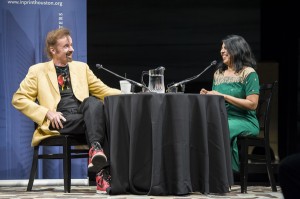While at T. C. Boyle . . .
October 29, 2012, by Allyn West
 T.C. Boyle said that one of his teachers in elementary school—Mr. Carter—would bribe the class to behave with a promise that he’d read them a story at the end of the week. Touring on the release of a novel, San Miguel, Boyle was in town to read his own story for the Inprint Margarett Root Brown Reading Series earlier this month.
T.C. Boyle said that one of his teachers in elementary school—Mr. Carter—would bribe the class to behave with a promise that he’d read them a story at the end of the week. Touring on the release of a novel, San Miguel, Boyle was in town to read his own story for the Inprint Margarett Root Brown Reading Series earlier this month.
He stepped on stage at the Alley Theater in a buttercream jacket and red vintage Nikes. He’d arrived from London that weekend, in time to take in the Alley’s production of Arthur Miller’s Death of a Salesman. Recalling the pleasure he took from the play, the pleasure of listening to his teacher read to him, Boyle said he wanted to share with us not an except from San Miguel but a story, something “with a beginning, a middle, and an end.”
“I’d used up all my sick days,” he began. A man, we learn, is stuck in his life. Up at the same time, roused by the same woman he’d seen in an old T-shirt, he says, “for something like a thousand consecutive mornings now.” Needing a change, a break, something, he calls his boss at an L.A. production studio, and an excuse—the lie at the epicenter of the story—burbles out.
A man, we learn, is stuck in his life. Up at the same time, roused by the same woman he’d seen in an old T-shirt, he says, “for something like a thousand consecutive mornings now.” Needing a change, a break, something, he calls his boss at an L.A. production studio, and an excuse—the lie at the epicenter of the story—burbles out.
“It’s the baby,” the man tells his boss. “She’s sick. Very sick.”
And the story grows as the lie grows. The man can’t stop things now that he’s started them. The baby’s sick, and the baby has leukemia, and the baby’s dead, there’s a funeral, and his co-workers are buying him drinks and baking him cannolis and presenting him with a grocery sack of cash and checks and sympathy cards. His wife eventually confronts him and stares him down with eyes “like two balls of granite.”
“This is fraud,” she says. “You know that.”
He can’t stop. As Boyle ends the story, the man turns and walks out “looking for somebody I can tell all about it.”
As Boyle read, I couldn’t help taking in the stage around him, the props of the production of Salesman. The bunkbed that belonged to Biff and Happy. The tiny, humiliatingly tiny kitchen table. The exposed nipple of the water heater from which Willy suck through a rubber tube the natural gas that won’t quite kill him.
As Boyle read, I couldn’t help taking in the stage around him, the props of the production of Salesman. The bunkbed that belonged to Biff and Happy. The tiny, humiliatingly tiny kitchen table. The exposed nipple of the water heater from which Willy suck through a rubber tube the natural gas that won’t quite kill him.
And I couldn’t help remembering the production I’d seen of Salesman in Las Cruces, New Mexico—the best I’ve ever seen—on the short stage of a high-school cafetorium, the metal folding chairs in rows just inches from the actors’ marks. A man named Dave Edwards played Willy. I’d known Dave peripherally as an amiable, shy man, seen him on the edges of rooms at this poetry reading or that cultural festival. Now here he was, a paunch puddling over a cinched-up beltline, his voice a futile rasp as he raged and fumed at his failures, his face as red as I’d seen one get.
And I couldn’t help remembering another man’s red face, the man my mother had dated the past 10 years. He was a salesman who’d bounced between jobs during the worst of the economic downturn President Obama and Governor Romney have been debating about. At one of these jobs, the man’s boss, a woman a few years younger than he, decided she’d allow casual clothes on Fridays. The office was outfitted with temporary cubicles in a suite in a strip mall in a rural Midwestern town. This man drove a used Mercedes to work. And one Friday he wore cargo shorts, the kind you see on college sophomores, and his boss made a joke about his legs. They were hairless, scabrous, atrophied, the legs of a man who’d spent his life sitting. He complained. He was fired a month later.
I’d always thought of him as a Willy Loman, a man who, Miller writes, “drives seven hundred miles, and when he gets there no one knows him any more, no one welcomes him.” A salesman’s “a man way out there in the blue, riding on a smile and a shoeshine. And when they start not smiling back—that’s an earthquake. And then you get yourself a couple of spots on your hat, and you’re finished.”
When I was visiting my mother, I’d hear the man wake up in the middle of the night, his bladder burning, and I’d hear his heels thump into the floor of the tiny hallway that led to the bathroom, hear the clink of the cheap wood seat against the porcelain tank. I’d see bottles of prescription drugs for his ailments, see his hands shake when he tried to pour the frozen margarita mix from the blender into the glass. I’d see his sons endure him, when they’d come over for dinner, see them check their phones under the table and fall asleep once we were done, wake up and announce they had to go, and when he’d walk them out and tell them at the door he loved them they wouldn’t say a thing. I knew he’d asked my mother to marry him, probably, by the end, two or three dozen times. Out of earshot, she’d say “Get the hint!” and roll her eyes and we’d laugh at him.
She finally moved out one weekend when the man was traveling, meeting clients in Las Vegas. She worried, she’d told me, that he might get violent. He’d threatened to. And maybe she worried her conviction would flag. He returned to an empty house, all the homey touches she’d added over the years stripped from the walls, peeled from the tabletops. He continued to call, to send text messages for the next year or so, begging her to reconsider. Please, he said. And then the messages tapered off, turned bitter. He hoped, he said, she was happy. He hoped she had no regrets. And then the messages became even more sporadic, until my mother stopped wincing when her phone chimed, and then they stopped coming at all. This summer, I was walking with her and my brother in our town square. The man was there on a bench, on his break, talking on his phone. I could just make out the dim familiarity of the voice we’d known. We pretended we didn’t see him.

